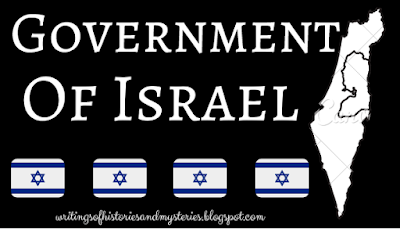Government of Israel
In the Biblical times, Israel had a theocracy with God as their guide. God wrote all of their laws and spoke to the people through prophets. Eventually, the people wanted a king leading to an absolute monarchy under Saul, David, Solomon, etc.
The modern Israeli government is described as a "parliamentary democracy," but it isn't too different from our own American government. Israel has three branches of government: the executive branch, legislative branch, and judicial branch. Israel has 11 constitutional laws but does not have a constitution. One interesting thing about Israel is that voters may either vote for the party or a particular person. If a person is voted for, the vote also counts toward the person's party. This is called the "party list proportional representation."
The President of the State is above all three of these branches. He is technically like a king in the sense that he is above all the branches and appoints the some of the different positions of the country including the Prime Minister. He is also like a president because he receives foreign diplomats, appoints judges, and signs laws.
The prime minister of the executive branch is the most powerful political figure of Israel. That is why the President of the United States visits the Prime Minister instead of the President of the State. The Prime Minister is advised by his cabinet that acts much like the American Cabinet. Instead of Secretary of Departments, Israel has Ministers of Ministries or Public Administrations.
The legislative branch is unicameral ("one house") instead of bicameral ("two houses"). America has two houses in this branch (The House of Representatives and the Senate which make up Congress), but Israel has one house (the Knesset). The Knesset has 120 members elected to four-year terms. Voters would elect their party and the party would elect people to fill the positions. Voters also do not know which person they are voting for since the parties use a "closed list."
The Judicial Selection Committee selects the judges of the judicial branch. This is composed of two cabinet members including the Minister of Justice, two Knesset members, two members of the Israel Bar Association, and three Supreme Court justices, one being the President of the Supreme Court). The Minister of Justice acts as the chairman.
The judicial branch has five different courts: the Judicial Court, the Labor Court, the Military Court, the Court of Admiralty (for naval trade disputes), and the Religious Court. The Religious Court decides on the rules of kosher or Kashrut, the Sabbath, Jewish burial, marital issues, and Jewish status of immigrants. This court is headed by the Rabbinate (the rabbis) of Israel. Of course, if one was a Muslim or Christian, then you would go to the court of your religious preference.
There are six districts (Central District, Haifa District, Jerusalem District, Northern District, Southern District, and Tel Aviv District) that divide into 15 sub-districts which divide into 50 regions. There are also local governments for cities. And on another note, Israel has a lot of political parties that could gain seats in the Knesset. They do not have two main political parties like we do in America.
On another note, Israel is considered one of the top 20 highly developed nations which is a pretty good growth considering the fact that it didn't even exist prior to 1948. This country claims technological advancement considered only second to Silicon Valley in California (this region is called "Silicon Wadi" in Israel). Besides that, the diamond, petroleum, solar energy, foreign banking, and electricity are other industries. Israel's university program is stated as one of the main reasons for their growing economy with respect to industry. Of course, tourism is another industry of the country.
I also want to say that I will not be discussing the religions of Israel in series as I have already done that in another article. You can find that article over here. I also discussed some of the contributors to the tensions in the Middle East. Although there is the possibility of terrorism, Israel is a surprisingly safe country compared to other countries in Europe, for example, that do not have as many enemies in surrounding countries. Israel is known for one of the best intelligence, espionage, and defense systems in the world.
To close this article, I will include Psalm 27:1. "The Lord is my light and my salvation; whom shall I fear? the Lord is the strength of my life; of whom shall I be afraid?" This verse says that we do not have to be afraid of anything or anyone when God is lighting the path we need to take. Everything and everyone that happened is all part of His plan. He has it all figured out so we can trust that He knows.




Comments
Post a Comment